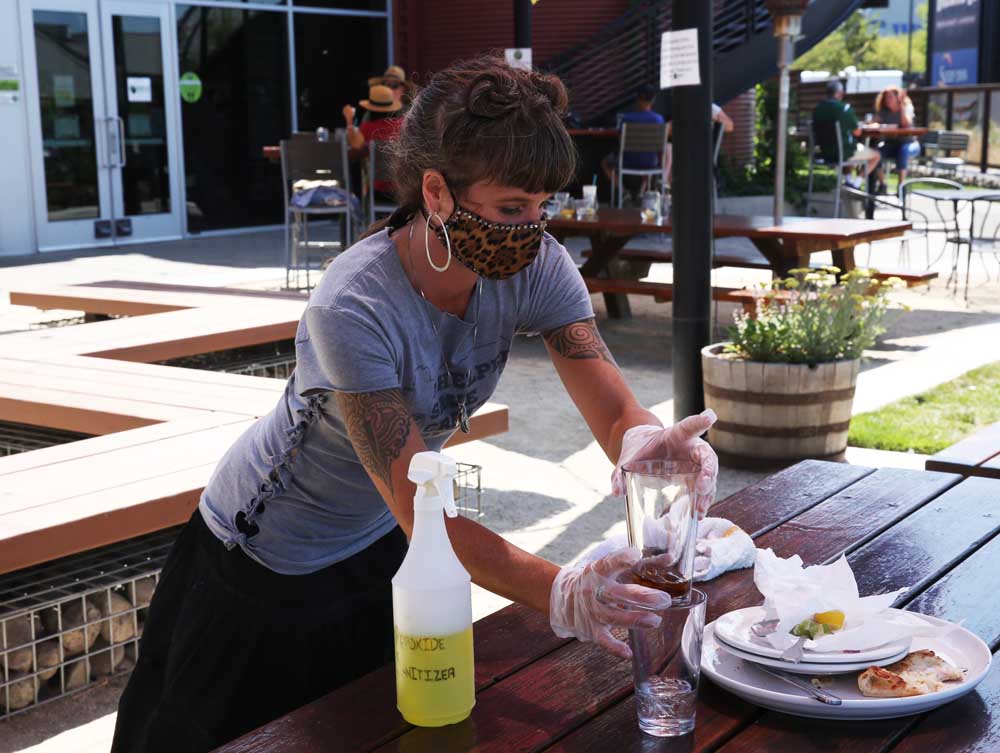Frontline workers don and doff masks and gloves to keep themselves and customers safe
Published 4:30 am Sunday, July 26, 2020

- Stephanie English cleans up a table at Worthy Brewing in Bend.
When Cayla Gleaton goes to tend bar at Worthy Brewing, she not only brings her apron and logo wear, but also her gloves and mask. The additions to her uniform are now an essential part of the standard uniform that help protect her from getting sick and protects others from COVID-19.
Gleaton is a frontline worker, someone who often works for minimum wage, tips and few benefits; she provides vital service to the community. These workers can be rubbish collectors, pharmacists, grocery delivery drivers, housekeepers or movers.
Like the frontline health care worker, their jobs are essential to keeping the fabric of the community going.
“Our staff is putting their health at risk for their financial benefit as they all have bills to pay,” said Monica Kline, Worthy’s executive chef food and beverage director.
At Worthy Brewing, the management has added COVID-19 specific instructions to the employee handbook and is providing washable and paper masks to all employees, as well as gloves, sanitizer and disinfectant, Kline wrote in an email.
The restaurant has also eliminated table service, so the wait staff doesn’t have to interact with guests as much. Customers order online through their phones, or walk up to the bar, Kline said.
“Our staff has been super receptive with all the changes as everyone has been pretty cautious about guest contact,” Kline said. “We have cross-trained a lot of staff to be able to function in various positions as well as having charts to help keep track of sanitizing.”
Frontline workers have more potential for exposure to the COVID-19 virus, which could be contributing to the rise in cases among younger people, said Morgan Emerson, Deschutes County Health Services spokesman.
In Oregon, the number of positive COVID-19 test results more than doubled in the 20-29 age group, according to the Oregon Health Authority. The number of cases rose from 1,052 to 2,613 from June 17 to July 15, according to the data.
Many frontline workers like servers are young and often socialize after work hours as a group. Some have reported not wearing a facial covering, Emerson said.
“It’s a trend we’re seeing in the frontline servers and staff,” Emerson said. “They participate in social gatherings without masks or remove masks after closing time. It’s important to wear a mask around anyone you don’t live with.”
Wearing a mask, Emerson said, is critical in stopping the spread of the virus particularly in close encounters indoors. Masks and frequent hand washing are great weapons in the fight of the virus, she said.
“Many frontline workers need their jobs and are providing a great service to our community,” Emerson said. “We can help protect them by wearing our masks.”
Recently investigators from the Oregon Liquor Control Commission and the Oregon Safety and Health Administration has cited or issued verbal warnings to businesses, some in downtown Bend, for not requiring customers to wear face masks. Gov. Kate Brown issued a mandate June 24 requiring masks for any indoor areas where a 6-foot distance cannot be maintained.
“We know the hospitality industry is doing their part to reduce virus spread,” said Jason Brandt, Oregon Restaurant & Lodging Association president and CEO.
“We look forward to embracing face coverings and physical distance between associated parties while our state continues to be challenged by virus spread occurring in private social gatherings.”
The Centers for Disease Control and Prevention recommends a face covering to protect against those people who may be pre-symptomatic and those who have the virus but don’t have any symptoms. In addition, the National Restaurant Association offers tips from the Federal Food and Drug Administration for protecting workers that range from providing contactless payment and ordering systems like at Worthy Brewing to how to reorientate a restaurant to provide maximum protection and 6-foot physical distancing.
For Gleaton, the extra gear allows her to work safely. She’d prefer to work then to be furloughed.
“I haven’t been nervous working at Worthy” said Gleaton, 26. “I use gloves and a face mask. We’re able to protect ourselves. Work helps keep the anxiety at bay. I’d rather be working wearing a face mask than not working at all.”






